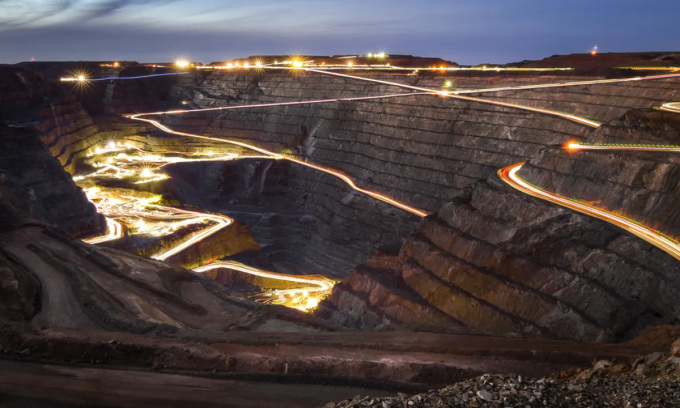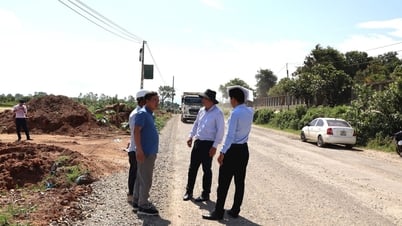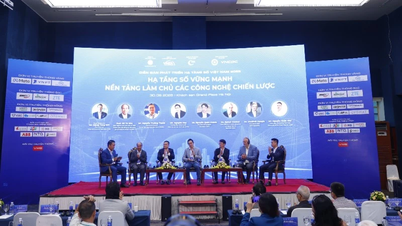The timing of when humans will run out of metals is controversial because it depends on many factors such as the ability to mine at great depths and recycling.

Humans are extracting and using minerals faster than they can be replenished. Photo: Christoph Schaarschmidt
Geological processes take thousands, even millions, of years to create mineral deposits. However, humans are extracting and using minerals faster than they can be replenished. According to some estimates, which are still controversial, supplies of some metals could be exhausted in less than 50 years, IFL Science reported on August 16.
Iron is the fourth most abundant element in the Earth’s crust, though most of it is still buried deep underground, and only a small fraction is accessible as iron ore. In 2022, experts estimate that the Earth contains about 180 billion tons of raw iron ore, with a total content of about 85 billion tons. While that sounds like a lot, it won’t last forever.
Iron ore could run out by 2062, American environmental analyst Lester Brown wrote in his 2008 book Plan B 3.0: Mobilizing to Save Civilization . He also argued that other important mineral supplies such as lead and copper could run out in the coming decades.
“Assuming 2% annual growth in mining, according to USGS data on economically recoverable reserves, the world has 17 years of lead reserves, 19 years of tin, 25 years of copper, 54 years of iron ore, and 68 years of bauxite (an aluminum ore),” Brown writes.
However, this claim is controversial. Other studies have shown that the possibility of metal depletion is significantly smaller than Brown's estimate. In addition, humans can recycle iron and related materials such as steel, meaning that the reserves in the Earth's crust are not all there.
The main metal that is at risk of being completely depleted in 100 years is copper, according to research by Theo Henckens, an expert at Utrecht University, published in Science Direct magazine in 2021. Six other minerals that are likely to be depleted in 100-200 years are antimony, gold, boron, silver, bismuth and molybdenum. In addition, nine minerals that could be depleted in 200-1,000 years are indium, chromium, zinc, nickel, tungsten, tin, rhenium, selenium and cadmium.
Other scientists say mineral depletion is not a major concern. Some believe humans have only scratched the surface of the Earth’s mineral supply. Most mined deposits are found just 300 meters below the Earth’s crust, but they may lie much deeper.
As technology continues to advance, it is possible that humans will tap into these deep reserves. However, the question is whether they can be mined without harming the planet or humans themselves.
“The mineral resources that exist inside the Earth should not be confused with reserves – the part of the mineral resources that have been identified, quantified, and can be economically extracted. Some studies predict shortages based on reserves, which are a very small fraction of the total resources that exist,” said Lluis Fontboté, a professor in the Department of Earth Sciences at the University of Geneva. He also said that the real issue here is not resource depletion but the environmental and social impacts of mining activities.
Thu Thao (According to IFL Science )
Source link


![[Photo] Panorama of the cable-stayed bridge, the final bottleneck of the Ben Luc-Long Thanh expressway](https://vphoto.vietnam.vn/thumb/1200x675/vietnam/resource/IMAGE/2025/9/30/391fdf21025541d6b2f092e49a17243f)
![[Photo] General Secretary To Lam, Secretary of the Central Military Commission attends the 12th Party Congress of the Army](https://vphoto.vietnam.vn/thumb/1200x675/vietnam/resource/IMAGE/2025/9/30/9b63aaa37ddb472ead84e3870a8ae825)

![[Photo] Solemn opening of the 12th Military Party Congress for the 2025-2030 term](https://vphoto.vietnam.vn/thumb/1200x675/vietnam/resource/IMAGE/2025/9/30/2cd383b3130d41a1a4b5ace0d5eb989d)
![[Photo] The 1st Congress of Phu Tho Provincial Party Committee, term 2025-2030](https://vphoto.vietnam.vn/thumb/1200x675/vietnam/resource/IMAGE/2025/9/30/1507da06216649bba8a1ce6251816820)
![[Photo] President Luong Cuong receives President of the Cuban National Assembly Esteban Lazo Hernandez](https://vphoto.vietnam.vn/thumb/1200x675/vietnam/resource/IMAGE/2025/9/30/4d38932911c24f6ea1936252bd5427fa)















































































![[Infographic] Key tasks in the 2025-2030 term of Dong Nai province](https://vphoto.vietnam.vn/thumb/402x226/vietnam/resource/IMAGE/2025/9/30/59bd43f4437a483099313af036fef0db)

















Comment (0)